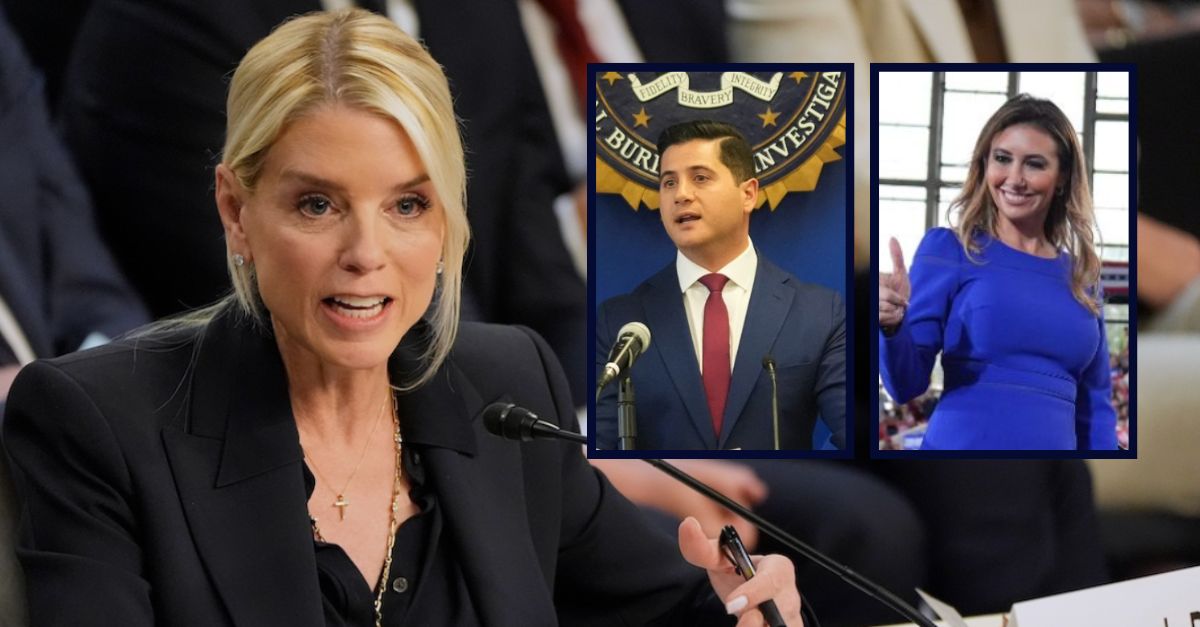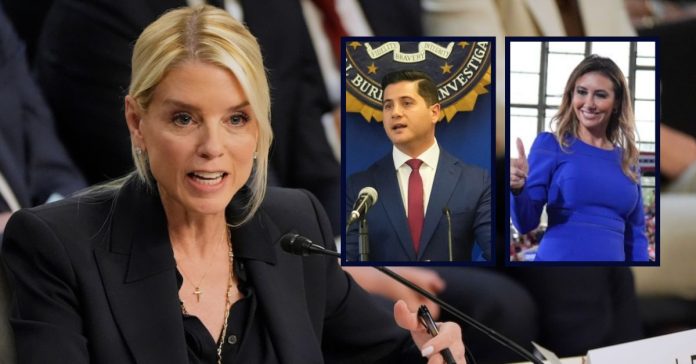
Main: Attorney General Pam Bondi appears before a Senate Judiciary Committee oversight hearing on Capitol Hill in Washington, Tuesday, Oct. 7, 2025. (AP Photo/Mark Schiefelbein). Left inset: Interim U.S. Attorney Bill Essayli answers questions during a news conference in Los Angeles, Wednesday, June 4, 2025. (AP Photo/Damian Dovarganes). Right inset: Alina Habba walks off stage after speaking before Republican presidential nominee former President Donald Trump arrives at a campaign rally at J.S. Dorton Arena, Monday, Nov. 4, 2024, in Raleigh, N.C. (AP Photo/Evan Vucci).
A third acting U.S. attorney installed by U.S. Attorney General Pam Bondi has been unlawfully serving in that role for months, a federal judge ruled Tuesday, just one week after the DOJ attempted to defend its personnel maneuvers in federal appellate court.
Like Alina Habba in New Jersey and Sigal Chattah in Nevada, Bilal “Bill” Essayli in Los Angeles, Calif., was first tapped to serve as interim U.S. attorney, a role that he could serve in temporarily, for 120 days, because the permanent office requires the advice and consent of the U.S. Senate under the Constitution.
And yet, each of their temporary stays as top federal prosecutors would continue on an acting basis, from the very moment they resigned from their interim jobs, because Bondi and President Donald Trump ensured that the first assistant U.S. attorney position (FAUSA) — second-in-command to the U.S. attorney — was vacant, through firings or reassignment.
In Essayli”s case, criminal defendants Ismael Garcia, Jr., Jaime Hector Ramirez, and Ronny Rojas, argued that Bondi had come up with “a handbook” under the Federal Vacancies Reform Act (FVRA) for handpicking temporary U.S. attorneys and avoiding congressional scrutiny — in a “limitless” way, by “simply fir[ing] the first assistant and backfill[ing] with anyone they choose,” while also dually naming the pick a special attorney with supervisory powers over the prosecutorial office.
Essayli’s resignation letter submitted prior to the expiration of his interim stint — and exactly mirroring Habba’s and Chattah’s letters — spelled out the maneuvering in perhaps the clearest way: “I hereby resign my position as Interim United States Attorney for the Central District of California effective at 5:00 p.m. PDT today, July 29, 2025 … I look forward to continuing to lead the U.S. Attorney’s Office for the Central District of California.”
Senior U.S. District Judge J. Michael Seabright, a George W. Bush appointee in Hawaii sitting by designation in the California case, ruled Tuesday that Essayli has been unlawfully serving as acting U.S. attorney since the end of July.
Love true crime? Sign up for our newsletter, The Law&Crime Docket, to get the latest real-life crime stories delivered right to your inbox
“Simply stated: Essayli unlawfully assumed the role of Acting United States Attorney for the Central District of California. He has been unlawfully serving in that capacity since his resignation from the interim role on July 29, 2025,” Seabright concluded. “Essayli may not perform the functions and duties of the United States Attorney as Acting United States Attorney. He is disqualified from serving in that role.”
“Moreover, Essayli remains the FAUSA and may perform the functions and duties of that office,” the judge added, ordering up the third such disqualification of an acting U.S. attorney following criminal defendants’ challenge of their authority, but without tossing out indictments as a remedy.
In a more detailed explanation, the judge said Essayli’s acting U.S. attorney service “is unlawful and has been unlawful since it began on July 29, 2025” because his resignation “did not trigger” § 3345(a) of the FVRA.
“First, § 3345(a) is triggered only by the death, resignation, or incapacity of a PAS officer [one appointed by the President and confirmed by the Senate], so Essayli’s service as Acting United States Attorney cannot be premised on his resignation from the interim role,” Seabright said. “And second, subsection (a)(1) assigns the acting role only to a first assistant in place when a PAS officer dies, resigns, or is incapacitated. Essayli was not the FAUSA when [Martin] Estrada resigned [as U.S. Attorney], so Essayli’s service as Acting United States Attorney cannot be premised on that resignation.”
Third, the judge said, Essayli’s dual status as a special attorney couldn’t lawfully make him acting U.S. attorney either.
“[F]inally, Essayli’s service cannot be premised on his appointment as a Special Attorney; that theory is foreclosed by the FVRA’s exclusivity provisions,” the judge concluded.
Essayli reacted on X by claiming “nothing is changing,” even as he shared an image of the ruling that said he was “never lawfully serving as Acting U.S. Attorney” yet “remains” first assistant.
For those who didn’t read the entire order, nothing is changing. I continue serving as the top federal prosecutor in the Central District of California. It ‘s an honor and privilege to serve President Trump and Attorney General Bondi, and I look forward to advancing their agenda… pic.twitter.com/0T7AILbLi1
— Acting U.S. Attorney Bill Essayli (@USAttyEssayli) October 29, 2025
While the judge found Essayli was “properly” appointed a special attorney and can supervise prosecutions as first assistant, he “cannot do so as Acting U.S. Attorney.” Nonetheless, Essayli still identifies himself on X as acting U.S. attorney.
On the heels of a 3rd Circuit U.S. Court of Appeals oral argument on Habba’s appointment, the 9th Circuit may very well end up having to consolidate DOJ appeals over Chattah and Essayli’s authority. In the end, this issue may be one for the U.S. Supreme Court to solve.
Read the order here.

